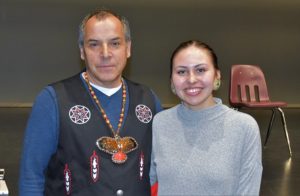Everyone should watch Cultural Mindfulness: Everyone has a story

By Kelly Anne Smith
NORTH BAY— Despite a blast of winter on Feb 25, about 150 people gathered at St. Joseph Scollard Hall Secondary School to watch a locally-produced Indigenous film, Cultural Mindfulness: Everyone Has A Story.
The film, shot and edited by North Bay local producer Ed Regan, features three Indigenous youth—Angel Armstrong, Mckenzie Ottereyes-Eagle, and Miigwan Buswa— who share stories of their past and how they embrace their future.
Film Director George Couchie educates on Indigenous culture and history as well, with an important reminder before the showing of the film.
“Everyone has been given a spark by the Creator. This is how we look after the spark we call life. The more we care for it, the larger it grows.”
Couchie then commended North Bay Mayor Al McDonald for his efforts on bringing Truth and Reconciliation to the forefront in the city with a special honour during the showing of the film.
“Other cities like Sudbury and Thunder Bay have looked at North Bay to try to learn and understand Truth and Reconciliation. I’d like to honour the mayor with an Eagle Feather from our community. Receiving an Eagle Feather talks about integrity, strength and honesty.”
Local youth then offered a smudge to the audience for a cleanse to have good thoughts.
Cultural Mindfulness is a North East Local Heath Integration Network (NE LHIN) project to improve front line health care providers’ cultural safety. Couchie explains that the film was intentioned for cultural safety training.
“The film was supposed to be an invitation to have the staff come out to do the training.”
Couchie had sent the finished product to North Bay Mayor who in turn suggested the film be offered for a public showing.
Couchie gushes credit towards Ed Regan for his creative film photography and editing.
“It has taken a life all its own. Ed’s done such a great job that it can go on its own. This needs to be seen by more people.”
Nipissing First Nation Chief Scott McLeod, North Bay Mayor Al McDonald, Angel Armstrong and George Couchie sat in conversation with the audience after viewing the 20-minute film.
Chief McLeod said that attitudes have to change.
“You have to start with yourselves, because that’s where the ripple effect starts. In order to make change at higher government levels, we need to make change in our own houses, in our own communities.”
Featured in the film, McKenzie Ottereyes-Eagle from Waswanipi First Nation in Northern Quebec is proud showing his connection to the land. The 23-year-old Nipissing University student is grateful to his father for teaching him.
“If it wasn’t for my father, I wouldn’t be able to share my culture,” expresses Ottereyes-Eagle. “I always give credit to my dad because he went to residential school.”
Ottereyes-Eagle says the system shamed his culture.
“They made him feel like his people were not human, in speaking the language or hunting and fishing. They made him feel like it’s not the way of life.”
Ottereyes-Eagle says his father went to the bush immediately when he returned home after residential school.
“He knew something was missing in his life so he went to his grandpa to regain the knowledge he lost in Residential School. Now he is teaching me and all my siblings to continue with the teachings he learned not just from his Grandparents but from the whole community. Everyone in the community becomes stronger as one,” explains Ottereyes-Eagle. “There is a big process for how we hunt. Now I know how to hunt and how to prepare and cook the animals properly.”
McKenzie always looked forward to his father’s stories after work at the sawmill.
“After his work, I’d sit down right beside him and ask him about his hunting stories, ‘Hey Dad, remember that time you killed a moose?’ I wanted to hear that story over and over again. I pictured myself with him in the story, in the canoe with his dad, and shooting a moose with him there. I think about that when I am out there. This is my dad’s story right here. I’m in my dad’s story but in real life.”
Nipissing First Nation’s Jason Harris enjoyed the experience of working on the film from behind the camera, saying he was pleased to work with talented people towards good social change. Harris is listed in the credits as Best Boy and second camera operator for the group presentation scenes.
As the credits roll, grass dancer Shkaabewis Tabobondung from Wasauksing First Nation dances to High Ridge Singers.
The Water Provides Life for All Creation segment has 20-year-old Angel Armstrong and Lisa Beaucage of Nipissing First Nation in water ceremony.
Armstrong credits her Grandfather for helping her heal through her culture.
“After my Dad passed, my Grandpa Alex Armstrong instilled in me to do a lot of healing. That’s when I started focusing on other people.”
She will be pursuing a teaching career after she finishes her Canadore College Indigenous Wellness and Addictions Prevention diploma this spring.
“When my dad Davis Armstrong committed suicide in 2007, it took a really big toll on my life. It really affected me, my own family, and my entire community. Now every single day, when I leave the house to go to the store or just go for a drive, I tell my Mom I love her and I tell my brother. You have to make that into a habit, telling people you love them.”
As a youngster, Angel was a fancy shawl dancer but she is now a jingle dancer, helping others to heal.
“My Dad’s passing made me recognize that people are struggling. That’s when I started dancing the jingle dress. And I’m still dancing,” explains Armstrong. “My message is people have their own issues going on, maybe mental health issues. It’s important to show your love everyday and live through love.”

